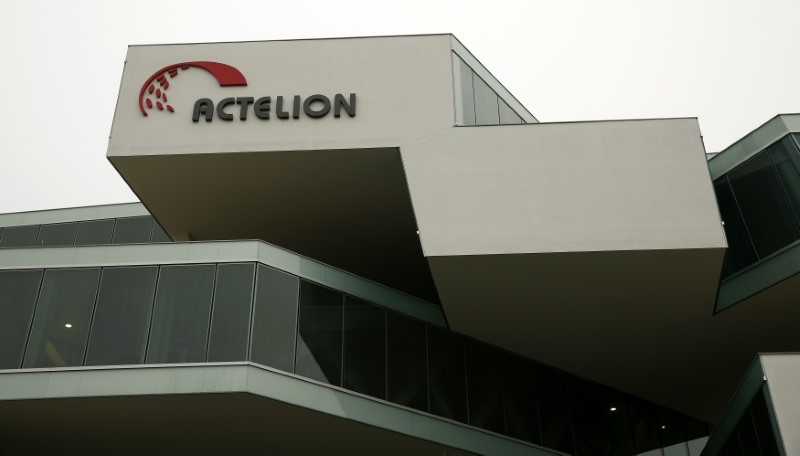By Maiya Keidan and John Miller
ZURICH (Reuters) - Actelion's silence speaks volumes to the dozens of event-driven hedge funds piling into the Swiss biotech firm, betting that Johnson & Johnson's (J&J) approach will result in an outright takeover and handsome returns.
A source familiar with the matter has told Reuters the two companies are discussing a bid of close to $27 billion (21.29 billion pounds), or 250 Swiss francs ($248) per share, which is 25 percent above Actelion's current share price.
Both companies have confirmed that U.S. diversified healthcare group J&J - maker of Pizbuin sun screen, surgical tools and arthritis drug Remicade - has approached Actelion about a potential takeover, but kept mum on details.
Co-founder and Chief Executive Jean-Paul Clozel and fellow shareholder Rudolf Maag have in the past been outspoken defenders of an independent Actelion, which has built a $2 billion business by focusing on a debilitating lung disease.
But they have made no public comment since the companies confirmed the talks a week ago, and Clozel would have some explaining to do if he rejected an offer with such a big premium, fund managers with a more conventional investment approach told Reuters.
"This time it's different. It has not been outright rejected. That's an indication that you can go a little bit bigger," said Michael Wegener, managing partner at Hong Kong-based event-driven hedge fund Case Equity Partners.
He has staked 1 percent of his fund's net assets under management on Actelion, but did not disclose the size of his assets, and is prepared to stock up if J&J tables a more detailed takeover proposal.
"We don't think Clozel is going to fight," said another hedge fund manager, who asked not to be named.
Clozel holds about 5 percent in the biotech firm, according to its annual report, while his wife Martine Clozel, co-founder and chief scientific officer, also owns an undisclosed stake.
No detailed data is available on share purchases by event-driven funds - who typically go after deal targets available for a discount to a mooted takeover offer - but Reuters journalists have been in contact with scores of fund managers who have discussed their tactics.
Daily turnover in Actelion shares has on average jumped more than fourfold since media reports of a J&J approach emerged on Nov. 24, from their three-month average.
The shares were trading at 200 francs as of 1603 GMT on Friday, up 27 percent since Nov. 24.
FACE-SAVING OFFER
Many investors are counting on J&J to structure a deal that would grant shareholders a cash payout and award Clozel a face-saving departure that honours the value of the firm's development pipeline of experimental drugs.
Some analysts argue J&J, or any rival suitor, will pay up for Actelion's launched products - two new drugs alone are seen generating combined peak sales of well above $4 billion - but have little appreciation for its drug development projects.
Analysts at brokerage Brian Garnier on Friday suggested Clozel could be offered to keep control of the experimental drugs portfolio and cash in on the rest.
"A stand-alone Actelion going forward would therefore consist of a pipeline company with limited or no revenues."
Rudolf Maag, another linchpin investor, who according to Thomson Reuters data holds 5.1 percent, has previous ties to J&J: he made much of his near $2 billion fortune when he sold his stake in medical device maker Synthes-Stratec to J&J four years ago.
Maag declined to comment this week, a departure from five years ago when he and Clozel defended Actelion against an attempt by U.S.-based hedge fund Elliott Advisors to get the biotech firm to put itself up for auction.
Hedge funds see Maag playing a critical role in a J&J deal, potentially persuading Clozel the offer is too good for shareholders to pass up.
"We are monitoring the situation very actively," said one hedge fund manager, speaking on condition of anonymity.
"I would strongly assume pretty much every other event-driven fund in the world is doing the same. I have heard of event-driven funds who already have several $100 million worth of stock."
